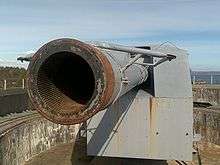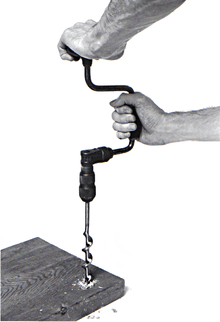Definify.com
Webster 1913 Edition
Bore
Bore
,Verb.
T.
[
imp. & p. p.
Bored
; p. pr. & vb. n.
Boring
.] [OE.
borien
, AS. borian
; akin to Icel. bora
, Dan. bore
, D. boren
, OHG. por[GREEK]n
, G. bohren
, L. forare
, Gr. [GREEK]
to plow, Zend bar
. √91.] 1.
To perforate or penetrate, as a solid body, by turning an auger, gimlet, drill, or other instrument; to make a round hole in or through; to pierce;
as, to
. bore
a plankI’ll believe as soon this whole earth may be
bored
. Shakespeare
2.
To form or enlarge by means of a boring instrument or apparatus;
as, to
. bore
a steam cylinder or a gun barrel; to bore
a holeShort but very powerful jaws, by means whereof the insect can
bore
, as with a centerbit, a cylindrical passage through the most solid wood. T. W. Harris.
3.
To make (a passage) by laborious effort, as in boring;
“What bustling crowds I bored.” as, to
; to force a narrow and difficult passage through. bore
one's way through a crowdGay.
4.
To weary by tedious iteration or by dullness; to tire; to trouble; to vex; to annoy; to pester.
He
bores
me with some trick. Shakespeare
Used to come and
bore
me at rare intervals. Carlyle.
5.
To befool; to trick.
[Obs.]
I am abused, betrayed; I am laughed at, scorned,
Baffled and
Baffled and
bored
, it seems. Beau. & Fl.
Bore
,Verb.
I.
1.
To make a hole or perforation with, or as with, a boring instrument; to cut a circular hole by the rotary motion of a tool;
as, to
. bore
for water or oil (i. e., to sink a well by boring for water or oil); to bore
with a gimlet; to bore
into a tree (as insects)2.
To be pierced or penetrated by an instrument that cuts as it turns;
as, this timber does not
. bore
well, or is hard to bore
3.
To push forward in a certain direction with laborious effort.
They take their flight . . .
boring
to the west. Dryden.
4.
(Man.)
To shoot out the nose or toss it in the air; – said of a horse.
Crabb.
Bore
(bōr)
, Noun.
1.
A hole made by boring; a perforation.
2.
The internal cylindrical cavity of a gun, cannon, pistol, or other firearm, or of a pipe or tube.
The
bores
of wind instruments. Bacon.
Love's counselor should fill the
bores
of hearing. Shakespeare
3.
The size of a hole; the interior diameter of a tube or gun barrel; the caliber.
4.
A tool for making a hole by boring, as an auger.
5.
Caliber; importance.
[Obs.]
Yet are they much too light for the
bore
of the matter. Shakespeare
6.
A person or thing that wearies by prolixity or dullness; a tiresome person or affair; any person or thing which causes ennui.
It is as great a
bore
as to hear a poet read his own verses. Hawthorne.
Bore
,Noun.
[Icel.
bāra
wave: cf. G. empor
upwards, OHG. bor
height, burren
to lift, perh. allied to AS. beran
, E. 1st bear
. √92.] (Physical Geog.)
(a)
A tidal flood which regularly or occasionally rushes into certain rivers of peculiar configuration or location, in one or more waves which present a very abrupt front of considerable height, dangerous to shipping, as at the mouth of the Amazon, in South America, the Hoogly and Indus, in India, and the Tsien-tang, in China.
(b)
Less properly, a very high and rapid tidal flow, when not so abrupt, such as occurs at the Bay of Fundy and in the British Channel.
Bore
,imp.
Bear
. Webster 1828 Edition
Bore
BORE
,Verb.
T.
1.
To perforate or penetrate a solid body and make a round hole by turning an auger, gimlet, or other instrument. Hence, to make hollow;; to form a round hole; as,to bore a cannon.2.
To eat out or make a hollow by gnawing or corroding, as a worm.3.
To penetrate or break through by turning or labor; as, to bore through a crowd.BORE
,Verb.
I.
1.
To pierce or enter by boring; as, an auger bores well.2.
To push forward toward a certain point.Boring to the west.
3.
With horsemen, a horse bores, when he carries his nose to the ground.4.
In a transitive or intransitive sense, to pierce the earth with scooping irons, which, when drawn out, bring with them samples of the different stratums, through which they pass. This is a method of discovering veins of ore and coal without opening a mine.BORE
,Noun.
1.
Any instrument for making holes by boring or turning, as an auger, gimlet or wimble.BORE
,Noun.
A sudden influx of the tide into a river or narrow strait.
BORE
, pret. of bear. [See Bear.]Definition 2026
bore
bore
English
Verb
bore (third-person singular simple present bores, present participle boring, simple past and past participle bored)
-
(transitive) To inspire boredom in somebody.
- Shakespeare
- He bores me with some trick.
- Carlyle
- […] used to come and bore me at rare intervals.
- Shakespeare
-
(transitive) To make a hole through something.
- Shakespeare
- I'll believe as soon this whole earth may be bored.
- Shakespeare
- (intransitive) To make a hole with, or as if with, a boring instrument; to cut a circular hole by the rotary motion of a tool.
- to bore for water or oil
- An insect bores into a tree.
- (transitive) To form or enlarge (something) by means of a boring instrument or apparatus.
- to bore a steam cylinder or a gun barrel; to bore a hole
- T. W. Harris
- short but very powerful jaws, by means whereof the insect can bore […] a cylindrical passage through the most solid wood
- (transitive) To make (a passage) by laborious effort, as in boring; to force a narrow and difficult passage through.
- to bore one's way through a crowd
- John Gay
- What bustling crowds I bored.
- (intransitive) To be pierced or penetrated by an instrument that cuts as it turns.
- This timber does not bore well.
- (intransitive) To push forward in a certain direction with laborious effort.
- Dryden
- They take their flight […] boring to the west.
- Dryden
- (of a horse) To shoot out the nose or toss it in the air.
- (Can we find and add a quotation of Crabb to this entry?)
- (obsolete) To fool; to trick.
- Beaumont and Fletcher
- I am abused, betrayed; I am laughed at, scorned, / Baffled and bored, it seems.
- Beaumont and Fletcher
Antonyms
Synonyms
- See Wikisaurus:bore
Related terms
Translations
to make a hole
|
|
to inspire boredom
|
|

Bore of a Krupp 38 cm gun at Batterie Vara / Møvik Fort, Norway.
Noun
bore (plural bores)
- A hole drilled or milled through something, or (by extension) its diameter .
- the bore of a cannon
- Francis Bacon
- the bores of wind instruments
- The tunnel inside of a gun's barrel through which the bullet travels when fired, or (by extension) its diameter.
- A tool, such as an auger, for making a hole by boring.
- A capped well drilled to tap artesian water. The place where the well exists.
- One who inspires boredom or lack of interest.
- Something that wearies by prolixity or dullness; a tiresome affair.
- Hawthorne
- It is as great a bore as to hear a poet read his own verses.
- Hawthorne
- Calibre; importance.
- Shakespeare
- Yet are they much too light for the bore of the matter.
- Shakespeare
Synonyms
- See also Wikisaurus:bore
Translations
A hole drilled or milled through something
The tunnel inside of a gun's barrel through which the bullet travels when fired
a tool for making a hole
|
One who inspires boredom
Etymology 2
Noun
bore (plural bores)
Translations
Translations
Etymology 3
Verb
bore
- simple past tense of bear
Anagrams
Cornish
Etymology
From Proto-Celtic *bāregos (“morning”). Compare Breton beure, Old Irish bárach, whence i mbárach (“tomorrow”), modern Irish amárach.
Noun
bore m
Mutation
Mutation of bore
Czech
Etymology 1
Pronunciation
- IPA(key): /borɛ/
- Rhymes: -orɛ
- Hyphenation: bo‧re
Noun
bore
- vocative singular of bor ("pine wood"):
Etymology 2
Pronunciation
Noun
bore
- vocative singular of bor ("boron"):
Anagrams
References
- ↑ Čmejrková, Světla; Hoffmannová, Jana; Klímová, Jana (2013) Čeština v pohledu synchronním a diachronním (in Czech), ISBN 8024621215, page 433
Norwegian Bokmål
Etymology
Verb
bore (imperative bor, present tense borer, simple past and past participle bora or boret, present participle borende)
Derived terms
References
- “bore” in The Bokmål Dictionary.
Welsh
Etymology
From Proto-Celtic *bāregos (“morning”). Compare Breton beure, Old Irish bárach (whence i mbárach (“tomorrow”), modern Irish amárach).
Pronunciation
- (North Wales) IPA(key): /ˈbɔrɛ/
- (South Wales) IPA(key): /ˈboːrɛ/
Noun
bore m (plural boreau)
Derived terms
- bore da (“good morning”)
Mutation
| Welsh mutation | |||
|---|---|---|---|
| radical | soft | nasal | aspirate |
| bore | fore | more | unchanged |
| Note: Some of these forms may be hypothetical. Not every possible mutated form of every word actually occurs. | |||
